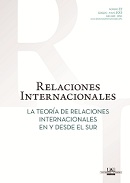Keywords:
International Relations Theory, Western, epistemology , Sociology of Science , core-periphery , geoculture, worldingCopyright (c) 2013 Arlene B. TICKNER, Ole WÆVER

This work is licensed under a Creative Commons Attribution-NonCommercial-NoDerivatives 4.0 International License.
Abstract
This abstract describes the introductory chapter of International Relations Scholarship Around the World, published by Routledge in 2009.The editors and authors of this introduction, Ole Wæver and Arlene B. Tickner, argue the necessity within International Relations theory to look beyond current geographical, spatial and temporal borders. Posing a debate regarding the discipline’s epistemic foundation and scientific data from mainstream sources, Wæver and Tickner contest the supposed globality of a discipline that is more often biased by local identity projected on other cultures and political issues. Wæver and Tickner seek to incorporate theory produced from important, yet unrepresented alternative sources. International Relations Scholarship Around the World is not only about other geographical spaces and non-traditional works from the field, but also valuable methodology and practices drawn from other fields currently not incorporated in International Relations. This introduction critiques how knowledge is produced, how academia and research is funded, how funding influences research content, and the effect of researcher bias. Wæver and Tickner call for International Relations Scholarship Around the World to advise scholars and researchers, emphasizing theoretical approaches, case study data, for international and local practitioners. Wæver and Tickner ask that we consider IR not just as a concrete experience, but also as a compilation of interrelated theories for understanding realities outside traditional spaces.





